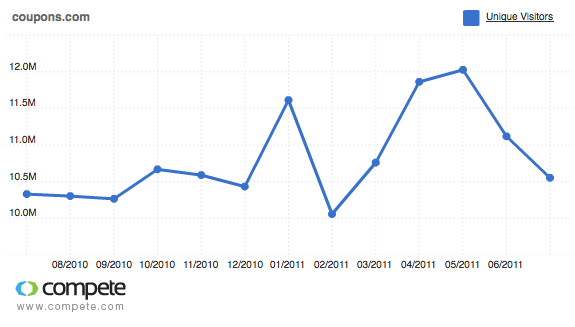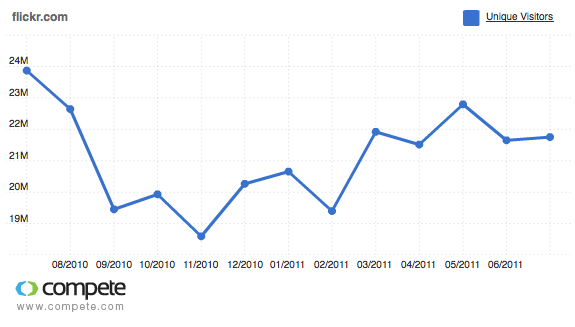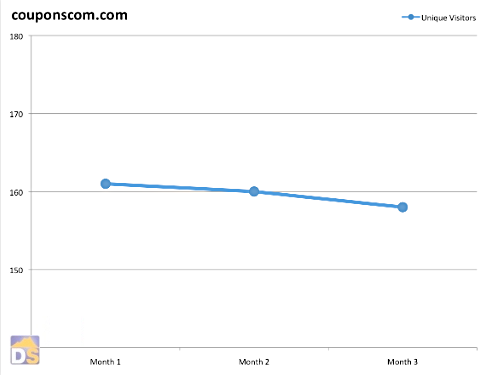 A study in New Scientist by Tyler Moore and Benjamin Edelman at Harvard University estimates that advertisements placed by Google on typo domains – domain names that are misspelled versions of popular websites – could potentially be producing as much as $500 million per year. And that’s only Google’s cut.
A study in New Scientist by Tyler Moore and Benjamin Edelman at Harvard University estimates that advertisements placed by Google on typo domains – domain names that are misspelled versions of popular websites – could potentially be producing as much as $500 million per year. And that’s only Google’s cut.
The question of Google’s profiting from typo domains aside, a recent serendipitous experience gave me the opportunity to further explore the profitability of typo domains. As we will see with real data from a typographical domain variant of coupons.com, not all typo domains are created equal.
What Typosquatting Is
A form of cybersquatting, typosquatting is a dubious practice that counts on Internet users’ making typographical errors when entering a web address into their browser. For example, a typosquatter might register the domain name “domainshirpa.com” with the hopes of attracting website traffic intended for “domainsherpa.com.”
The practice is controversial (illegal when the typo domain name infringes on a trademark), as a typosquatter can divert visitors from the actual site they are seeking and can financially profit from the popularity of another site.
Typo Domain for Coupons.com
In June I interviewed Steven Boal, president and CEO of the hugely successful Coupons.com. Coupons.com recently received $200 million from investors in a deal that values the 13-year-old coupon company at $1 billion.
Coincidentally, shortly before our scheduled interview, I noticed a typo domain variant of Coupons.com that was available at a NameJet auction: couponscom.com. The typo in this case is the missing “dot” between the intended domain name (coupons) and the TLD (com).
When I told Steven about it, he – as an entrepreneur well versed in domain name law – recognized that he had a few basic options. He could:
- Notify the NameJet legal department of a trademark issue and ask that the domain name be pulled from auction,
- File a UDRP case and take their case to a panel, or
- Do nothing.
As a fourth option, I offered to purchase the domain name at auction and transfer it to Steven at cost. He agreed, and after winning the auction for $123 – a sum much lower than the cost of one hour of an attorney’s time or of filing a UDRP case – I transferred couponscom.com to him.
Typosquatting Research Opportunity
The potential to monitor the performance of a typo domain name piqued my curiosity. Would the domain name actually produce traffic? I asked Steven if I could test the effectiveness of couponscom.com as a typo domain, and he graciously agreed. Over the course of three months, I measured the number of type-ins resulting from couponscom.com using a parking service called The Parking Place.
The results may surprise you.
Estimated Results of Couponscom.com
According to Compete.com (figure below), Coupons.com receives about 10 million unique visitors per month. To determine what number of type-ins couponscom.com might command, I looked to flicker.com, a typo variant of the popular social photo-sharing website Flickr.com. Flicker.com (now owned by Flickr’s parent company, Yahoo) used to average about 300,000 unique visitors per month, which is 1.4 percent of the 21 million monthly unique visitors to Flickr.com (figure below). I estimated that if couponscom.com was an effective typo domain for type-in views, it would produce at least 0.1 percent of Coupons.com’s traffic, or 10,000 unique visitors per month.


Actual Typo Traffic to Couponscom.com
Over the course of the three months I measured type-in traffic, couponscom.com averaged 160 monthly unique visitors (figure below). A far cry from the 10,000 visitors I hypothesized.

My guess as to why this domain name was not particularly successful at producing type-in traffic is that “couponscom.com” is simply not a typo people often make. Further, if someone was to type in only “couponscom” into their browser, not all browsers will automatically append the “.com” to the end of the domain name. For example, Safari does, but Firefox does not. Without the TLD in the web address, the domain name will not resolve.
Typosquatting Conclusion
There is an entire industry focused on driving traffic to websites; typo domains are simply one niche of that industry. And as with any domain name, some typo domains are better than others.
My unscientific study suggests couponscom.com is not going to be a gold mine. So was it worth the $123 for Coupons.com to buy couponscom.com? Parking the domain while I measured type-in traffic generated a paltry $7 — enough only to treat Steven to coffee next time we meet — but I suspect it is worth far more to Steven to keep others from infringing on his company’s brand.
Do you have typo data you are willing to share? Please do so in the comments.
[Photo credit: Gregory Szarkiewicz / FreeDigitalPhotos.net]
If you enjoyed this article, subscribe for updates (it's free)
 Be Interviewed on DomainSherpa
Be Interviewed on DomainSherpa


















Great and much useful stuff. Well, infringing the trademark can seriously cause legal issues, so it’s better to stay away from these kind of illegal/unwise activities. Thanks for your article !
Yes, thank you Adam. I couldn’t understand why so many domainers could keep thousands of domains. Rule of multiples.
I am gonna tweak my business goals just abit.
Horrible headline. Never use a question that can readily be answered no.
Thanks for your comment, John.
It’s my job as publisher of DomainSherpa to raise questions, provide data and help people understand topics, not to make value judgements about tactics or force people to think the same way I do. At least that’s how I try to function. :)
I always try to balance the sensational with the factual when it comes to headlines. I think I understand your point of view about the headline being “horrible.” However, I think the article leaves the headline question open for interpretation by the reader. Readers have already commented both in support and opposition to the headline. On one hand, someone can buy a domain name like couponscom.com or whatevercom.com, and get a fraction of the traffic to whatever.com, as noted on Compete.com or other services. Maybe you can even earn 4x the cost of owning such a domain name (as I noted with a “bad” typo domain), but at what cost? There are trademarked words and phrases out there that investors should be aware of that could lead to legal costs that are 1000-1,000,000x the revenue earned. “Coupons.com”, for example, is a trademarked term even though “coupons” is a generic word. If domain investors are going to take risks, I’d like to provide the data that will allow them to make an educated decision about the risks involved. My hope is that this article does that.
You made enough to pay the renewal fee in a month and you’re asking if it’s profitable?
Rinse-wash-repeat over thousands of domains and you’ll see how profitable it becomes.
And yes you did pick a version that wasn’t the best but it’s still profitable.
Yes, I can see how generic typo domains can easily generate tens to hundreds of thousands of dollars in revenue per year. Thanks for your comment, Adam.
Profitable until a trademark owners sues you for $100k plus attorney fees. Some companies are getting pretty aggressive on these. The concept of turning them over on complaint does not always work. We have had numerous clients who ended up making full financial disclosure and payment of tens of thousands of dollars in order to extradite themselves from a cybersquatting lawsuit for which there were few defenses.
Sorry but Flicker.com is NOT a typo of Flickr.com. Its a word. FlickR.com is actually a typo of Flicker.com – IMO. FlickER was created in 1998 whereas FlickR was created in 2003 – according to DomainTools.com. If I bought and owned Flicker in 1998 then I’d be pretty damn pissed off at anyone who said I was typo-squatting FlickR. I’d fight that tooth and nail.
Its not the fault of Flicker that someone wanted to be cutesy and create a non-word (presumably to brand) but more likely to be cutesy at the time. Or maybe Flicker.com was not available. And, even more so, if it wasnt available then too bad.
Its nothing like Couponscom.com – which is purposely registered to gain traffic from typos so it cant even be compared.
This is like the “cyber-squatting” BS going on out there… Its getting to the point where purchasing and holding a good name has become “bad” somehow. But it is perfectly fine for someone to go and buy real property, a nice corner lot maybe, and hold it for decades while everything around the area builds up – then sell it for a fortune.
What I think the problem is (throwing the LEGAL issues aside for a moment), is jealousy and envy and nothing more.
@Mike2: You bring up a lot of valid points and I’m glad you commented.
Flicker.com may not an example of typosquatting for the domain name flickr.com, for the reasons you pointed out. It was, however, an example of “domain names that are misspelled versions of popular websites.”
My unstated assertion is that flicker.com was a typo domain of flickr.com because it fails the “radio test” — hearing the domain name only (not spelled) would overwhelming direct a user to flicker.com.
This was the only data point I could find related to a variation of a domain name that was the undeveloped version of a popular website. So I used it merely for data similarity purposes. I agree — not ideal, but useful to make a hypothesis, conduct the experiment and share the data.
Thanks again for your comments,
Michael
As an aside:
It can be argued whether flicker.com was typo squatting by looking at the use of the domain name and parking advertisements in the years leading up to the acquisition by Yahoo.com. Just because one domain name was registered before another — as a single fact — is not enough to define it as non-typosquatting. Flickr was registered as a trademark in 2008 in the United States, and anyone infringing on a trademark can be held liable. Whether right or wrong, many UDRP cases have been decided in favor of the trademark holder because the parked page being displayed on a domain name involved trademarks in one way or another. I’ll leave that discussion for a later time, with specific data and/or an attorney’s viewpoint.
Appreciate your insights.
Thanks, Duarte.
Don’t forget there is a whole legitimate market also of typo domains.
You could have a typo of a generic domain that is not even Online with a website. It may never have been used, but your generic domain typo may still be making good money with real, existing direct navigation typo traffic.
It’s not all shady. There is a legitimate, legal market there also.
That is true, Mike. A generic word could definitely have a often mistyped variation and I believe that would be legal and potentially lucrative.
Not worth it.
when I started domaining, I knew nothing about it, and I bought a few domains that were available with marks on it. Portuguese-related insurance, real estate, and others.
Today I have none, and use all my energy in a better geo domains, brands or better.
It’s safe, dignified, and helps you sleep well.
If it is not a legal practice, you will not allow it to be better person
I fully agree, José. I’d never buy typodomains of trademarked URLs or businesses, like Coupons.com. But I did want to collect the data and share it as long as I had the opportunity.
Great post with real data is always useful. Too many others say this or that, but I want to see the data. Well done.
Thanks, Domains1. Glad you found it useful.